Exploring Legal and Ethical Dilemmas in Human Service Practice
VerifiedAdded on 2020/04/21
|9
|4562
|304
Homework Assignment
AI Summary
This assignment addresses a series of tutorial questions related to the legal and ethical responsibilities of human service workers in South Australia. It covers topics such as the applicable jurisdiction for criminal offenses, examples of federal and state legislation, and the types of legal issues human service workers may encounter. The assignment explores ethical codes from AASW and ACWA, outlining responsibilities regarding colleagues' unethical behavior and the implications for new staff induction. It examines ethical boundaries, including sexual relationships with clients and conflicts of interest. The assignment further analyzes scenarios involving client arrest, bail, and interactions with police, along with the application of intervention orders and child protection legislation. It delves into the assessment of child protection cases, definitions of child abuse, and the rights of the child in detention, providing a comprehensive overview of the legal and ethical considerations within the field of human services.
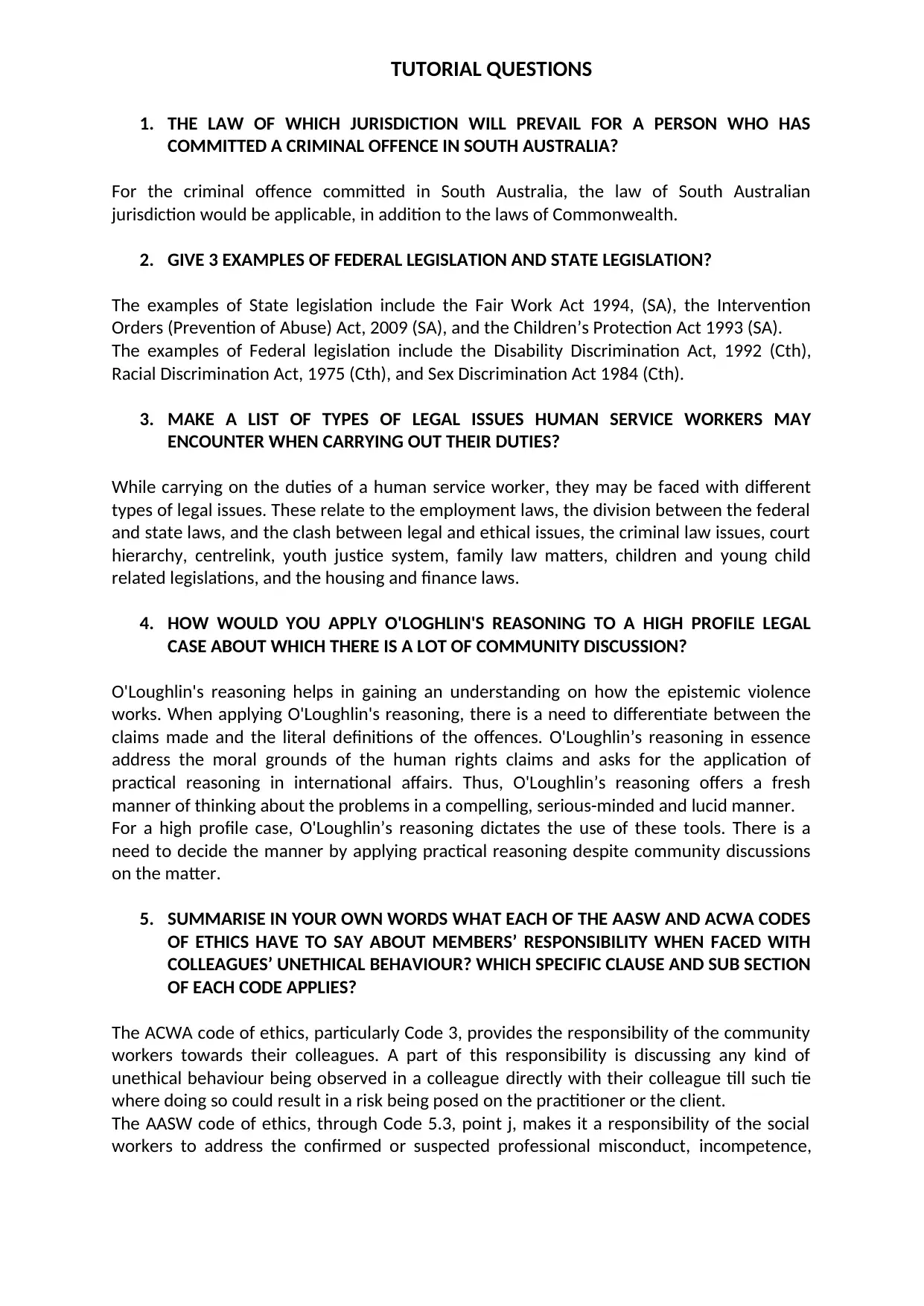
TUTORIAL QUESTIONS
1. THE LAW OF WHICH JURISDICTION WILL PREVAIL FOR A PERSON WHO HAS
COMMITTED A CRIMINAL OFFENCE IN SOUTH AUSTRALIA?
For the criminal offence committed in South Australia, the law of South Australian
jurisdiction would be applicable, in addition to the laws of Commonwealth.
2. GIVE 3 EXAMPLES OF FEDERAL LEGISLATION AND STATE LEGISLATION?
The examples of State legislation include the Fair Work Act 1994, (SA), the Intervention
Orders (Prevention of Abuse) Act, 2009 (SA), and the Children’s Protection Act 1993 (SA).
The examples of Federal legislation include the Disability Discrimination Act, 1992 (Cth),
Racial Discrimination Act, 1975 (Cth), and Sex Discrimination Act 1984 (Cth).
3. MAKE A LIST OF TYPES OF LEGAL ISSUES HUMAN SERVICE WORKERS MAY
ENCOUNTER WHEN CARRYING OUT THEIR DUTIES?
While carrying on the duties of a human service worker, they may be faced with different
types of legal issues. These relate to the employment laws, the division between the federal
and state laws, and the clash between legal and ethical issues, the criminal law issues, court
hierarchy, centrelink, youth justice system, family law matters, children and young child
related legislations, and the housing and finance laws.
4. HOW WOULD YOU APPLY O'LOGHLIN'S REASONING TO A HIGH PROFILE LEGAL
CASE ABOUT WHICH THERE IS A LOT OF COMMUNITY DISCUSSION?
O'Loughlin's reasoning helps in gaining an understanding on how the epistemic violence
works. When applying O'Loughlin's reasoning, there is a need to differentiate between the
claims made and the literal definitions of the offences. O'Loughlin’s reasoning in essence
address the moral grounds of the human rights claims and asks for the application of
practical reasoning in international affairs. Thus, O'Loughlin’s reasoning offers a fresh
manner of thinking about the problems in a compelling, serious-minded and lucid manner.
For a high profile case, O'Loughlin’s reasoning dictates the use of these tools. There is a
need to decide the manner by applying practical reasoning despite community discussions
on the matter.
5. SUMMARISE IN YOUR OWN WORDS WHAT EACH OF THE AASW AND ACWA CODES
OF ETHICS HAVE TO SAY ABOUT MEMBERS’ RESPONSIBILITY WHEN FACED WITH
COLLEAGUES’ UNETHICAL BEHAVIOUR? WHICH SPECIFIC CLAUSE AND SUB SECTION
OF EACH CODE APPLIES?
The ACWA code of ethics, particularly Code 3, provides the responsibility of the community
workers towards their colleagues. A part of this responsibility is discussing any kind of
unethical behaviour being observed in a colleague directly with their colleague till such tie
where doing so could result in a risk being posed on the practitioner or the client.
The AASW code of ethics, through Code 5.3, point j, makes it a responsibility of the social
workers to address the confirmed or suspected professional misconduct, incompetence,
1. THE LAW OF WHICH JURISDICTION WILL PREVAIL FOR A PERSON WHO HAS
COMMITTED A CRIMINAL OFFENCE IN SOUTH AUSTRALIA?
For the criminal offence committed in South Australia, the law of South Australian
jurisdiction would be applicable, in addition to the laws of Commonwealth.
2. GIVE 3 EXAMPLES OF FEDERAL LEGISLATION AND STATE LEGISLATION?
The examples of State legislation include the Fair Work Act 1994, (SA), the Intervention
Orders (Prevention of Abuse) Act, 2009 (SA), and the Children’s Protection Act 1993 (SA).
The examples of Federal legislation include the Disability Discrimination Act, 1992 (Cth),
Racial Discrimination Act, 1975 (Cth), and Sex Discrimination Act 1984 (Cth).
3. MAKE A LIST OF TYPES OF LEGAL ISSUES HUMAN SERVICE WORKERS MAY
ENCOUNTER WHEN CARRYING OUT THEIR DUTIES?
While carrying on the duties of a human service worker, they may be faced with different
types of legal issues. These relate to the employment laws, the division between the federal
and state laws, and the clash between legal and ethical issues, the criminal law issues, court
hierarchy, centrelink, youth justice system, family law matters, children and young child
related legislations, and the housing and finance laws.
4. HOW WOULD YOU APPLY O'LOGHLIN'S REASONING TO A HIGH PROFILE LEGAL
CASE ABOUT WHICH THERE IS A LOT OF COMMUNITY DISCUSSION?
O'Loughlin's reasoning helps in gaining an understanding on how the epistemic violence
works. When applying O'Loughlin's reasoning, there is a need to differentiate between the
claims made and the literal definitions of the offences. O'Loughlin’s reasoning in essence
address the moral grounds of the human rights claims and asks for the application of
practical reasoning in international affairs. Thus, O'Loughlin’s reasoning offers a fresh
manner of thinking about the problems in a compelling, serious-minded and lucid manner.
For a high profile case, O'Loughlin’s reasoning dictates the use of these tools. There is a
need to decide the manner by applying practical reasoning despite community discussions
on the matter.
5. SUMMARISE IN YOUR OWN WORDS WHAT EACH OF THE AASW AND ACWA CODES
OF ETHICS HAVE TO SAY ABOUT MEMBERS’ RESPONSIBILITY WHEN FACED WITH
COLLEAGUES’ UNETHICAL BEHAVIOUR? WHICH SPECIFIC CLAUSE AND SUB SECTION
OF EACH CODE APPLIES?
The ACWA code of ethics, particularly Code 3, provides the responsibility of the community
workers towards their colleagues. A part of this responsibility is discussing any kind of
unethical behaviour being observed in a colleague directly with their colleague till such tie
where doing so could result in a risk being posed on the practitioner or the client.
The AASW code of ethics, through Code 5.3, point j, makes it a responsibility of the social
workers to address the confirmed or suspected professional misconduct, incompetence,
Paraphrase This Document
Need a fresh take? Get an instant paraphrase of this document with our AI Paraphraser
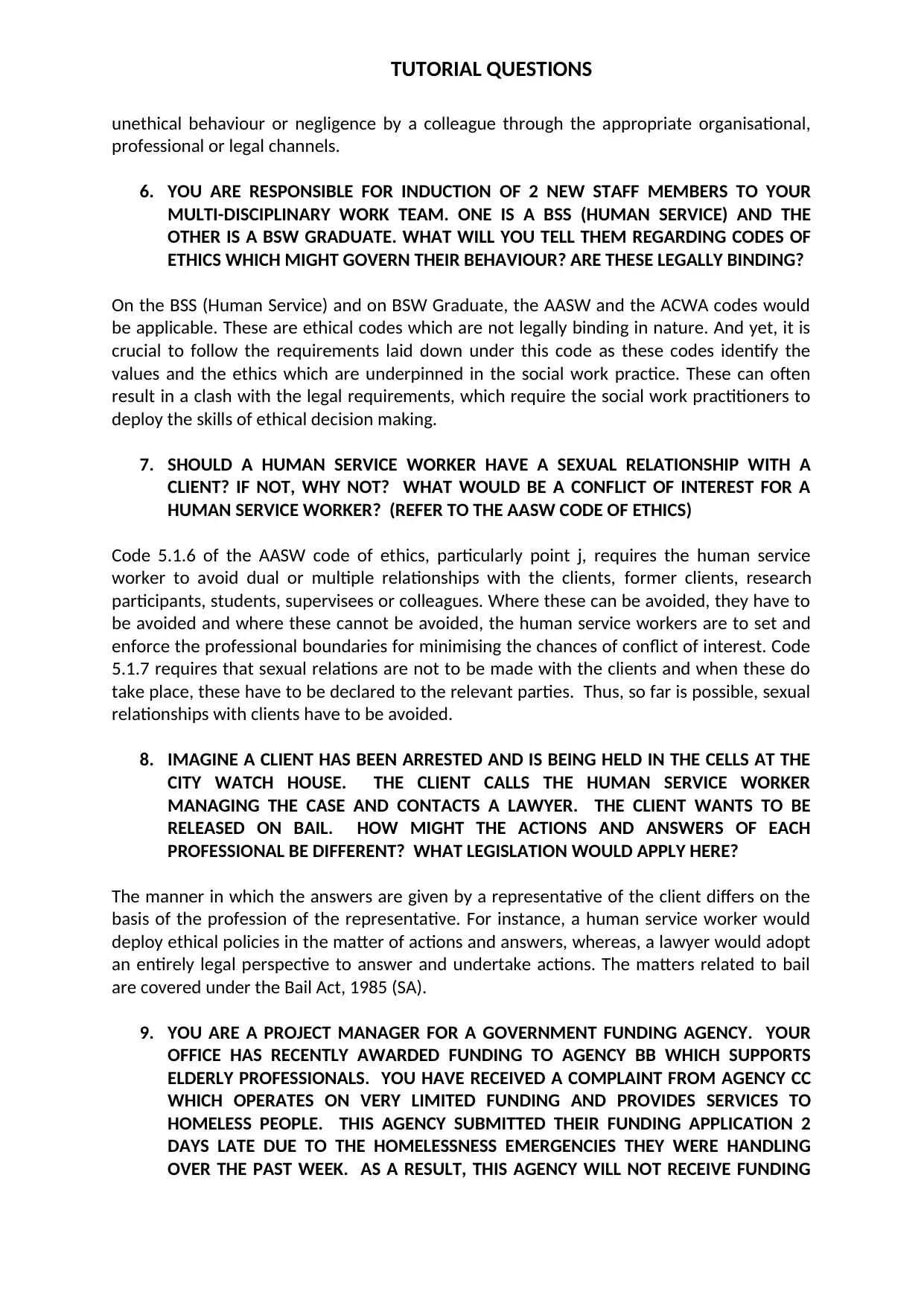
TUTORIAL QUESTIONS
unethical behaviour or negligence by a colleague through the appropriate organisational,
professional or legal channels.
6. YOU ARE RESPONSIBLE FOR INDUCTION OF 2 NEW STAFF MEMBERS TO YOUR
MULTI-DISCIPLINARY WORK TEAM. ONE IS A BSS (HUMAN SERVICE) AND THE
OTHER IS A BSW GRADUATE. WHAT WILL YOU TELL THEM REGARDING CODES OF
ETHICS WHICH MIGHT GOVERN THEIR BEHAVIOUR? ARE THESE LEGALLY BINDING?
On the BSS (Human Service) and on BSW Graduate, the AASW and the ACWA codes would
be applicable. These are ethical codes which are not legally binding in nature. And yet, it is
crucial to follow the requirements laid down under this code as these codes identify the
values and the ethics which are underpinned in the social work practice. These can often
result in a clash with the legal requirements, which require the social work practitioners to
deploy the skills of ethical decision making.
7. SHOULD A HUMAN SERVICE WORKER HAVE A SEXUAL RELATIONSHIP WITH A
CLIENT? IF NOT, WHY NOT? WHAT WOULD BE A CONFLICT OF INTEREST FOR A
HUMAN SERVICE WORKER? (REFER TO THE AASW CODE OF ETHICS)
Code 5.1.6 of the AASW code of ethics, particularly point j, requires the human service
worker to avoid dual or multiple relationships with the clients, former clients, research
participants, students, supervisees or colleagues. Where these can be avoided, they have to
be avoided and where these cannot be avoided, the human service workers are to set and
enforce the professional boundaries for minimising the chances of conflict of interest. Code
5.1.7 requires that sexual relations are not to be made with the clients and when these do
take place, these have to be declared to the relevant parties. Thus, so far is possible, sexual
relationships with clients have to be avoided.
8. IMAGINE A CLIENT HAS BEEN ARRESTED AND IS BEING HELD IN THE CELLS AT THE
CITY WATCH HOUSE. THE CLIENT CALLS THE HUMAN SERVICE WORKER
MANAGING THE CASE AND CONTACTS A LAWYER. THE CLIENT WANTS TO BE
RELEASED ON BAIL. HOW MIGHT THE ACTIONS AND ANSWERS OF EACH
PROFESSIONAL BE DIFFERENT? WHAT LEGISLATION WOULD APPLY HERE?
The manner in which the answers are given by a representative of the client differs on the
basis of the profession of the representative. For instance, a human service worker would
deploy ethical policies in the matter of actions and answers, whereas, a lawyer would adopt
an entirely legal perspective to answer and undertake actions. The matters related to bail
are covered under the Bail Act, 1985 (SA).
9. YOU ARE A PROJECT MANAGER FOR A GOVERNMENT FUNDING AGENCY. YOUR
OFFICE HAS RECENTLY AWARDED FUNDING TO AGENCY BB WHICH SUPPORTS
ELDERLY PROFESSIONALS. YOU HAVE RECEIVED A COMPLAINT FROM AGENCY CC
WHICH OPERATES ON VERY LIMITED FUNDING AND PROVIDES SERVICES TO
HOMELESS PEOPLE. THIS AGENCY SUBMITTED THEIR FUNDING APPLICATION 2
DAYS LATE DUE TO THE HOMELESSNESS EMERGENCIES THEY WERE HANDLING
OVER THE PAST WEEK. AS A RESULT, THIS AGENCY WILL NOT RECEIVE FUNDING
unethical behaviour or negligence by a colleague through the appropriate organisational,
professional or legal channels.
6. YOU ARE RESPONSIBLE FOR INDUCTION OF 2 NEW STAFF MEMBERS TO YOUR
MULTI-DISCIPLINARY WORK TEAM. ONE IS A BSS (HUMAN SERVICE) AND THE
OTHER IS A BSW GRADUATE. WHAT WILL YOU TELL THEM REGARDING CODES OF
ETHICS WHICH MIGHT GOVERN THEIR BEHAVIOUR? ARE THESE LEGALLY BINDING?
On the BSS (Human Service) and on BSW Graduate, the AASW and the ACWA codes would
be applicable. These are ethical codes which are not legally binding in nature. And yet, it is
crucial to follow the requirements laid down under this code as these codes identify the
values and the ethics which are underpinned in the social work practice. These can often
result in a clash with the legal requirements, which require the social work practitioners to
deploy the skills of ethical decision making.
7. SHOULD A HUMAN SERVICE WORKER HAVE A SEXUAL RELATIONSHIP WITH A
CLIENT? IF NOT, WHY NOT? WHAT WOULD BE A CONFLICT OF INTEREST FOR A
HUMAN SERVICE WORKER? (REFER TO THE AASW CODE OF ETHICS)
Code 5.1.6 of the AASW code of ethics, particularly point j, requires the human service
worker to avoid dual or multiple relationships with the clients, former clients, research
participants, students, supervisees or colleagues. Where these can be avoided, they have to
be avoided and where these cannot be avoided, the human service workers are to set and
enforce the professional boundaries for minimising the chances of conflict of interest. Code
5.1.7 requires that sexual relations are not to be made with the clients and when these do
take place, these have to be declared to the relevant parties. Thus, so far is possible, sexual
relationships with clients have to be avoided.
8. IMAGINE A CLIENT HAS BEEN ARRESTED AND IS BEING HELD IN THE CELLS AT THE
CITY WATCH HOUSE. THE CLIENT CALLS THE HUMAN SERVICE WORKER
MANAGING THE CASE AND CONTACTS A LAWYER. THE CLIENT WANTS TO BE
RELEASED ON BAIL. HOW MIGHT THE ACTIONS AND ANSWERS OF EACH
PROFESSIONAL BE DIFFERENT? WHAT LEGISLATION WOULD APPLY HERE?
The manner in which the answers are given by a representative of the client differs on the
basis of the profession of the representative. For instance, a human service worker would
deploy ethical policies in the matter of actions and answers, whereas, a lawyer would adopt
an entirely legal perspective to answer and undertake actions. The matters related to bail
are covered under the Bail Act, 1985 (SA).
9. YOU ARE A PROJECT MANAGER FOR A GOVERNMENT FUNDING AGENCY. YOUR
OFFICE HAS RECENTLY AWARDED FUNDING TO AGENCY BB WHICH SUPPORTS
ELDERLY PROFESSIONALS. YOU HAVE RECEIVED A COMPLAINT FROM AGENCY CC
WHICH OPERATES ON VERY LIMITED FUNDING AND PROVIDES SERVICES TO
HOMELESS PEOPLE. THIS AGENCY SUBMITTED THEIR FUNDING APPLICATION 2
DAYS LATE DUE TO THE HOMELESSNESS EMERGENCIES THEY WERE HANDLING
OVER THE PAST WEEK. AS A RESULT, THIS AGENCY WILL NOT RECEIVE FUNDING
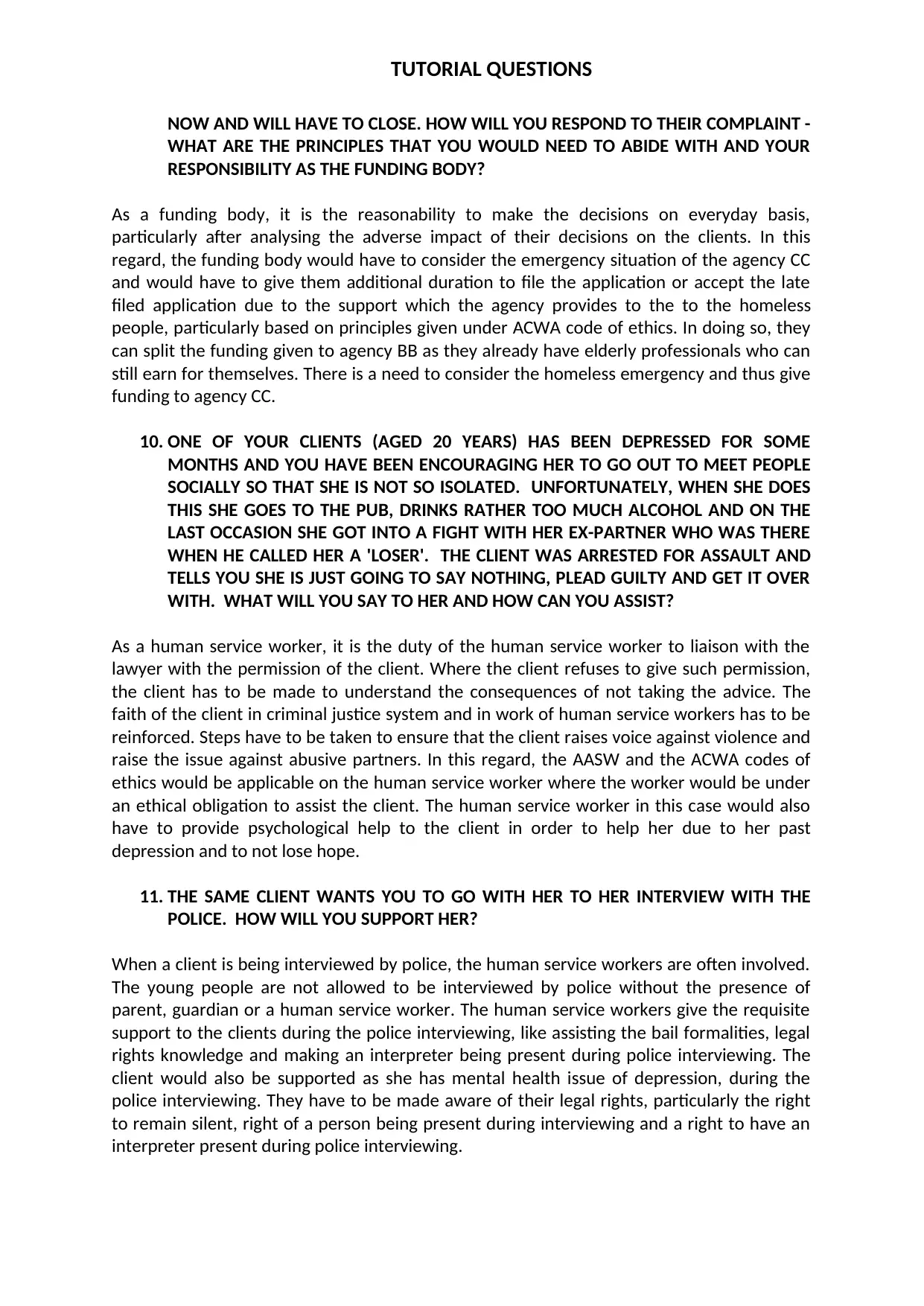
TUTORIAL QUESTIONS
NOW AND WILL HAVE TO CLOSE. HOW WILL YOU RESPOND TO THEIR COMPLAINT -
WHAT ARE THE PRINCIPLES THAT YOU WOULD NEED TO ABIDE WITH AND YOUR
RESPONSIBILITY AS THE FUNDING BODY?
As a funding body, it is the reasonability to make the decisions on everyday basis,
particularly after analysing the adverse impact of their decisions on the clients. In this
regard, the funding body would have to consider the emergency situation of the agency CC
and would have to give them additional duration to file the application or accept the late
filed application due to the support which the agency provides to the to the homeless
people, particularly based on principles given under ACWA code of ethics. In doing so, they
can split the funding given to agency BB as they already have elderly professionals who can
still earn for themselves. There is a need to consider the homeless emergency and thus give
funding to agency CC.
10. ONE OF YOUR CLIENTS (AGED 20 YEARS) HAS BEEN DEPRESSED FOR SOME
MONTHS AND YOU HAVE BEEN ENCOURAGING HER TO GO OUT TO MEET PEOPLE
SOCIALLY SO THAT SHE IS NOT SO ISOLATED. UNFORTUNATELY, WHEN SHE DOES
THIS SHE GOES TO THE PUB, DRINKS RATHER TOO MUCH ALCOHOL AND ON THE
LAST OCCASION SHE GOT INTO A FIGHT WITH HER EX-PARTNER WHO WAS THERE
WHEN HE CALLED HER A 'LOSER'. THE CLIENT WAS ARRESTED FOR ASSAULT AND
TELLS YOU SHE IS JUST GOING TO SAY NOTHING, PLEAD GUILTY AND GET IT OVER
WITH. WHAT WILL YOU SAY TO HER AND HOW CAN YOU ASSIST?
As a human service worker, it is the duty of the human service worker to liaison with the
lawyer with the permission of the client. Where the client refuses to give such permission,
the client has to be made to understand the consequences of not taking the advice. The
faith of the client in criminal justice system and in work of human service workers has to be
reinforced. Steps have to be taken to ensure that the client raises voice against violence and
raise the issue against abusive partners. In this regard, the AASW and the ACWA codes of
ethics would be applicable on the human service worker where the worker would be under
an ethical obligation to assist the client. The human service worker in this case would also
have to provide psychological help to the client in order to help her due to her past
depression and to not lose hope.
11. THE SAME CLIENT WANTS YOU TO GO WITH HER TO HER INTERVIEW WITH THE
POLICE. HOW WILL YOU SUPPORT HER?
When a client is being interviewed by police, the human service workers are often involved.
The young people are not allowed to be interviewed by police without the presence of
parent, guardian or a human service worker. The human service workers give the requisite
support to the clients during the police interviewing, like assisting the bail formalities, legal
rights knowledge and making an interpreter being present during police interviewing. The
client would also be supported as she has mental health issue of depression, during the
police interviewing. They have to be made aware of their legal rights, particularly the right
to remain silent, right of a person being present during interviewing and a right to have an
interpreter present during police interviewing.
NOW AND WILL HAVE TO CLOSE. HOW WILL YOU RESPOND TO THEIR COMPLAINT -
WHAT ARE THE PRINCIPLES THAT YOU WOULD NEED TO ABIDE WITH AND YOUR
RESPONSIBILITY AS THE FUNDING BODY?
As a funding body, it is the reasonability to make the decisions on everyday basis,
particularly after analysing the adverse impact of their decisions on the clients. In this
regard, the funding body would have to consider the emergency situation of the agency CC
and would have to give them additional duration to file the application or accept the late
filed application due to the support which the agency provides to the to the homeless
people, particularly based on principles given under ACWA code of ethics. In doing so, they
can split the funding given to agency BB as they already have elderly professionals who can
still earn for themselves. There is a need to consider the homeless emergency and thus give
funding to agency CC.
10. ONE OF YOUR CLIENTS (AGED 20 YEARS) HAS BEEN DEPRESSED FOR SOME
MONTHS AND YOU HAVE BEEN ENCOURAGING HER TO GO OUT TO MEET PEOPLE
SOCIALLY SO THAT SHE IS NOT SO ISOLATED. UNFORTUNATELY, WHEN SHE DOES
THIS SHE GOES TO THE PUB, DRINKS RATHER TOO MUCH ALCOHOL AND ON THE
LAST OCCASION SHE GOT INTO A FIGHT WITH HER EX-PARTNER WHO WAS THERE
WHEN HE CALLED HER A 'LOSER'. THE CLIENT WAS ARRESTED FOR ASSAULT AND
TELLS YOU SHE IS JUST GOING TO SAY NOTHING, PLEAD GUILTY AND GET IT OVER
WITH. WHAT WILL YOU SAY TO HER AND HOW CAN YOU ASSIST?
As a human service worker, it is the duty of the human service worker to liaison with the
lawyer with the permission of the client. Where the client refuses to give such permission,
the client has to be made to understand the consequences of not taking the advice. The
faith of the client in criminal justice system and in work of human service workers has to be
reinforced. Steps have to be taken to ensure that the client raises voice against violence and
raise the issue against abusive partners. In this regard, the AASW and the ACWA codes of
ethics would be applicable on the human service worker where the worker would be under
an ethical obligation to assist the client. The human service worker in this case would also
have to provide psychological help to the client in order to help her due to her past
depression and to not lose hope.
11. THE SAME CLIENT WANTS YOU TO GO WITH HER TO HER INTERVIEW WITH THE
POLICE. HOW WILL YOU SUPPORT HER?
When a client is being interviewed by police, the human service workers are often involved.
The young people are not allowed to be interviewed by police without the presence of
parent, guardian or a human service worker. The human service workers give the requisite
support to the clients during the police interviewing, like assisting the bail formalities, legal
rights knowledge and making an interpreter being present during police interviewing. The
client would also be supported as she has mental health issue of depression, during the
police interviewing. They have to be made aware of their legal rights, particularly the right
to remain silent, right of a person being present during interviewing and a right to have an
interpreter present during police interviewing.
⊘ This is a preview!⊘
Do you want full access?
Subscribe today to unlock all pages.

Trusted by 1+ million students worldwide
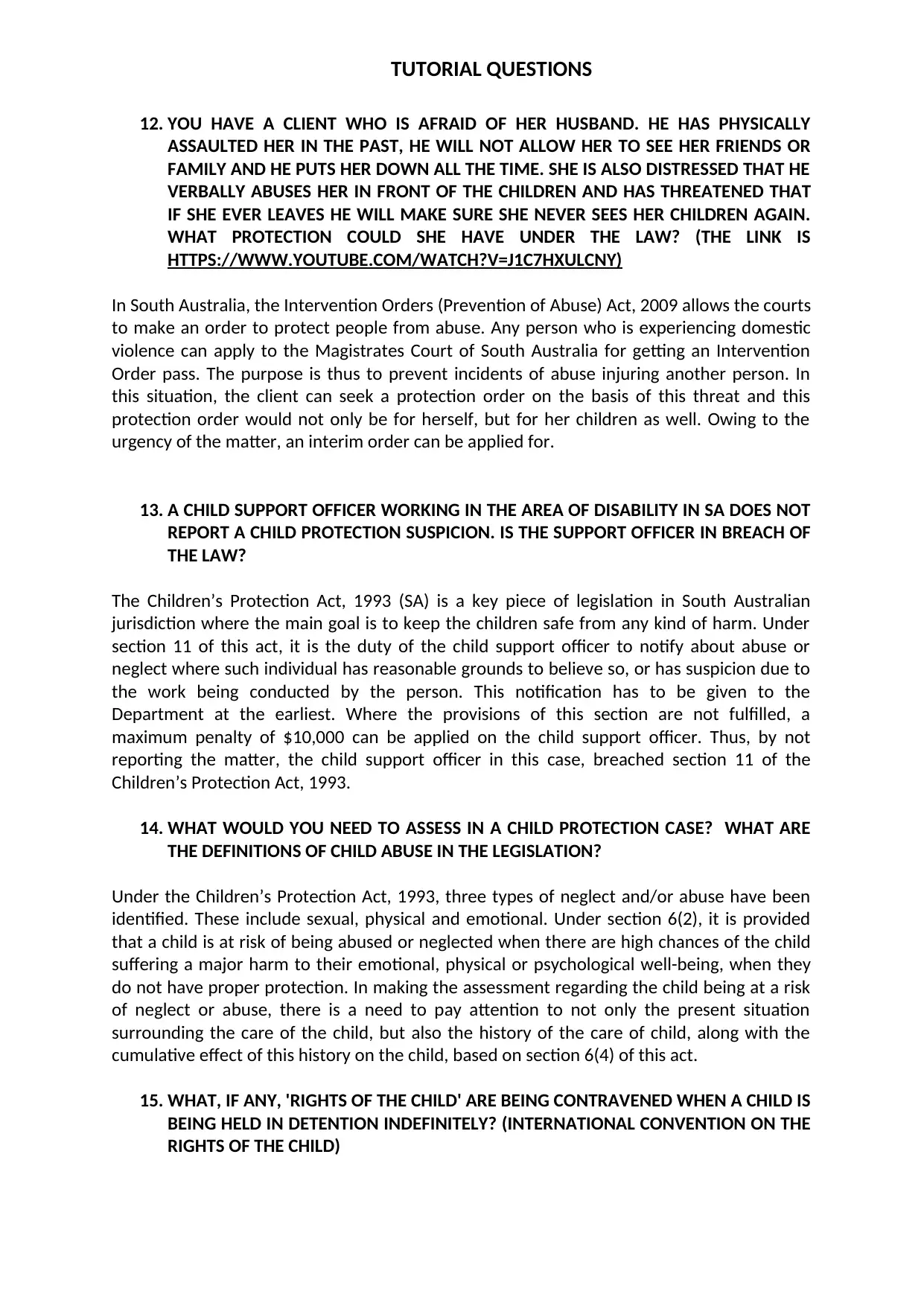
TUTORIAL QUESTIONS
12. YOU HAVE A CLIENT WHO IS AFRAID OF HER HUSBAND. HE HAS PHYSICALLY
ASSAULTED HER IN THE PAST, HE WILL NOT ALLOW HER TO SEE HER FRIENDS OR
FAMILY AND HE PUTS HER DOWN ALL THE TIME. SHE IS ALSO DISTRESSED THAT HE
VERBALLY ABUSES HER IN FRONT OF THE CHILDREN AND HAS THREATENED THAT
IF SHE EVER LEAVES HE WILL MAKE SURE SHE NEVER SEES HER CHILDREN AGAIN.
WHAT PROTECTION COULD SHE HAVE UNDER THE LAW? (THE LINK IS
HTTPS://WWW.YOUTUBE.COM/WATCH?V=J1C7HXULCNY)
In South Australia, the Intervention Orders (Prevention of Abuse) Act, 2009 allows the courts
to make an order to protect people from abuse. Any person who is experiencing domestic
violence can apply to the Magistrates Court of South Australia for getting an Intervention
Order pass. The purpose is thus to prevent incidents of abuse injuring another person. In
this situation, the client can seek a protection order on the basis of this threat and this
protection order would not only be for herself, but for her children as well. Owing to the
urgency of the matter, an interim order can be applied for.
13. A CHILD SUPPORT OFFICER WORKING IN THE AREA OF DISABILITY IN SA DOES NOT
REPORT A CHILD PROTECTION SUSPICION. IS THE SUPPORT OFFICER IN BREACH OF
THE LAW?
The Children’s Protection Act, 1993 (SA) is a key piece of legislation in South Australian
jurisdiction where the main goal is to keep the children safe from any kind of harm. Under
section 11 of this act, it is the duty of the child support officer to notify about abuse or
neglect where such individual has reasonable grounds to believe so, or has suspicion due to
the work being conducted by the person. This notification has to be given to the
Department at the earliest. Where the provisions of this section are not fulfilled, a
maximum penalty of $10,000 can be applied on the child support officer. Thus, by not
reporting the matter, the child support officer in this case, breached section 11 of the
Children’s Protection Act, 1993.
14. WHAT WOULD YOU NEED TO ASSESS IN A CHILD PROTECTION CASE? WHAT ARE
THE DEFINITIONS OF CHILD ABUSE IN THE LEGISLATION?
Under the Children’s Protection Act, 1993, three types of neglect and/or abuse have been
identified. These include sexual, physical and emotional. Under section 6(2), it is provided
that a child is at risk of being abused or neglected when there are high chances of the child
suffering a major harm to their emotional, physical or psychological well-being, when they
do not have proper protection. In making the assessment regarding the child being at a risk
of neglect or abuse, there is a need to pay attention to not only the present situation
surrounding the care of the child, but also the history of the care of child, along with the
cumulative effect of this history on the child, based on section 6(4) of this act.
15. WHAT, IF ANY, 'RIGHTS OF THE CHILD' ARE BEING CONTRAVENED WHEN A CHILD IS
BEING HELD IN DETENTION INDEFINITELY? (INTERNATIONAL CONVENTION ON THE
RIGHTS OF THE CHILD)
12. YOU HAVE A CLIENT WHO IS AFRAID OF HER HUSBAND. HE HAS PHYSICALLY
ASSAULTED HER IN THE PAST, HE WILL NOT ALLOW HER TO SEE HER FRIENDS OR
FAMILY AND HE PUTS HER DOWN ALL THE TIME. SHE IS ALSO DISTRESSED THAT HE
VERBALLY ABUSES HER IN FRONT OF THE CHILDREN AND HAS THREATENED THAT
IF SHE EVER LEAVES HE WILL MAKE SURE SHE NEVER SEES HER CHILDREN AGAIN.
WHAT PROTECTION COULD SHE HAVE UNDER THE LAW? (THE LINK IS
HTTPS://WWW.YOUTUBE.COM/WATCH?V=J1C7HXULCNY)
In South Australia, the Intervention Orders (Prevention of Abuse) Act, 2009 allows the courts
to make an order to protect people from abuse. Any person who is experiencing domestic
violence can apply to the Magistrates Court of South Australia for getting an Intervention
Order pass. The purpose is thus to prevent incidents of abuse injuring another person. In
this situation, the client can seek a protection order on the basis of this threat and this
protection order would not only be for herself, but for her children as well. Owing to the
urgency of the matter, an interim order can be applied for.
13. A CHILD SUPPORT OFFICER WORKING IN THE AREA OF DISABILITY IN SA DOES NOT
REPORT A CHILD PROTECTION SUSPICION. IS THE SUPPORT OFFICER IN BREACH OF
THE LAW?
The Children’s Protection Act, 1993 (SA) is a key piece of legislation in South Australian
jurisdiction where the main goal is to keep the children safe from any kind of harm. Under
section 11 of this act, it is the duty of the child support officer to notify about abuse or
neglect where such individual has reasonable grounds to believe so, or has suspicion due to
the work being conducted by the person. This notification has to be given to the
Department at the earliest. Where the provisions of this section are not fulfilled, a
maximum penalty of $10,000 can be applied on the child support officer. Thus, by not
reporting the matter, the child support officer in this case, breached section 11 of the
Children’s Protection Act, 1993.
14. WHAT WOULD YOU NEED TO ASSESS IN A CHILD PROTECTION CASE? WHAT ARE
THE DEFINITIONS OF CHILD ABUSE IN THE LEGISLATION?
Under the Children’s Protection Act, 1993, three types of neglect and/or abuse have been
identified. These include sexual, physical and emotional. Under section 6(2), it is provided
that a child is at risk of being abused or neglected when there are high chances of the child
suffering a major harm to their emotional, physical or psychological well-being, when they
do not have proper protection. In making the assessment regarding the child being at a risk
of neglect or abuse, there is a need to pay attention to not only the present situation
surrounding the care of the child, but also the history of the care of child, along with the
cumulative effect of this history on the child, based on section 6(4) of this act.
15. WHAT, IF ANY, 'RIGHTS OF THE CHILD' ARE BEING CONTRAVENED WHEN A CHILD IS
BEING HELD IN DETENTION INDEFINITELY? (INTERNATIONAL CONVENTION ON THE
RIGHTS OF THE CHILD)
Paraphrase This Document
Need a fresh take? Get an instant paraphrase of this document with our AI Paraphraser
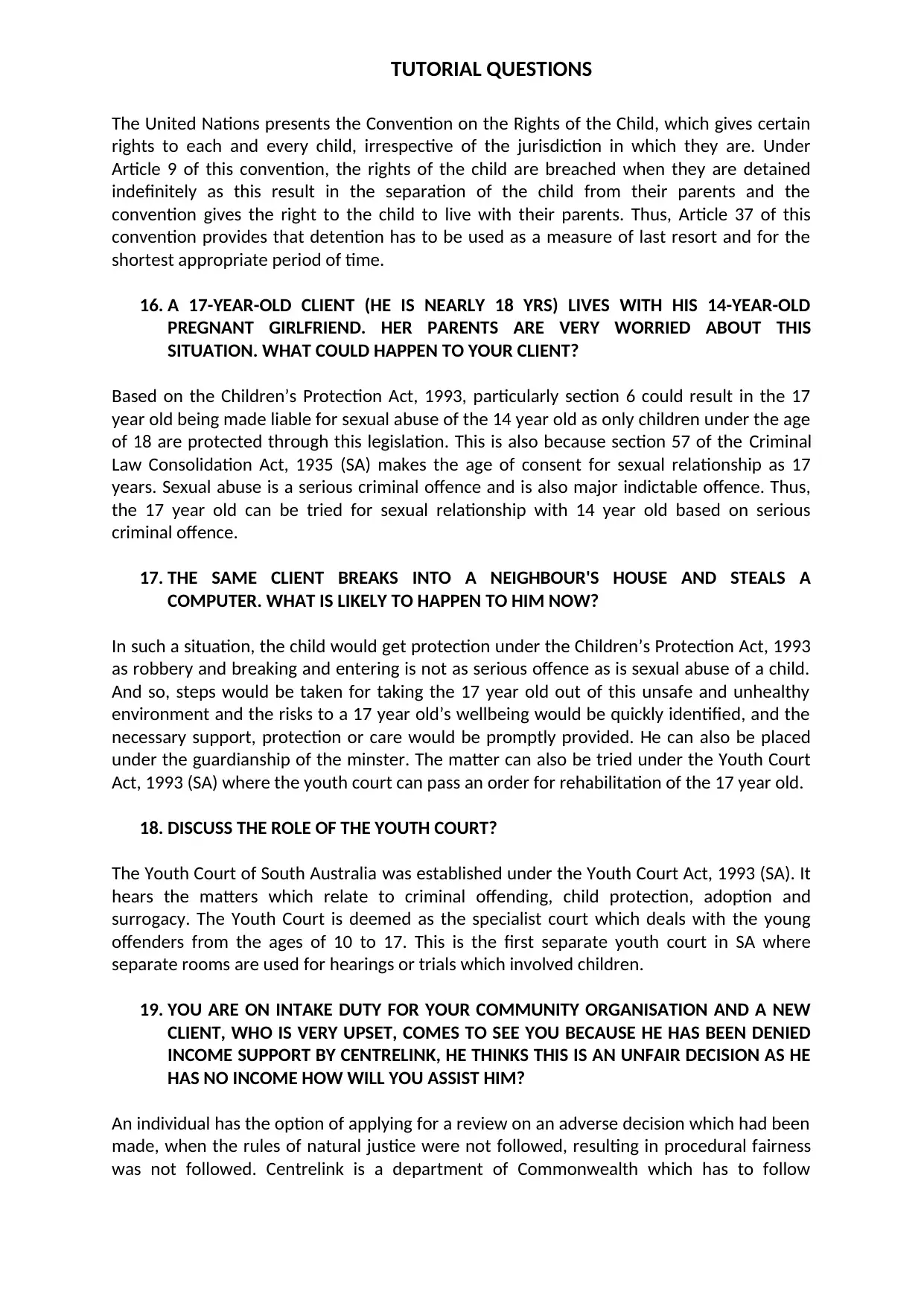
TUTORIAL QUESTIONS
The United Nations presents the Convention on the Rights of the Child, which gives certain
rights to each and every child, irrespective of the jurisdiction in which they are. Under
Article 9 of this convention, the rights of the child are breached when they are detained
indefinitely as this result in the separation of the child from their parents and the
convention gives the right to the child to live with their parents. Thus, Article 37 of this
convention provides that detention has to be used as a measure of last resort and for the
shortest appropriate period of time.
16. A 17-YEAR-OLD CLIENT (HE IS NEARLY 18 YRS) LIVES WITH HIS 14-YEAR-OLD
PREGNANT GIRLFRIEND. HER PARENTS ARE VERY WORRIED ABOUT THIS
SITUATION. WHAT COULD HAPPEN TO YOUR CLIENT?
Based on the Children’s Protection Act, 1993, particularly section 6 could result in the 17
year old being made liable for sexual abuse of the 14 year old as only children under the age
of 18 are protected through this legislation. This is also because section 57 of the Criminal
Law Consolidation Act, 1935 (SA) makes the age of consent for sexual relationship as 17
years. Sexual abuse is a serious criminal offence and is also major indictable offence. Thus,
the 17 year old can be tried for sexual relationship with 14 year old based on serious
criminal offence.
17. THE SAME CLIENT BREAKS INTO A NEIGHBOUR'S HOUSE AND STEALS A
COMPUTER. WHAT IS LIKELY TO HAPPEN TO HIM NOW?
In such a situation, the child would get protection under the Children’s Protection Act, 1993
as robbery and breaking and entering is not as serious offence as is sexual abuse of a child.
And so, steps would be taken for taking the 17 year old out of this unsafe and unhealthy
environment and the risks to a 17 year old’s wellbeing would be quickly identified, and the
necessary support, protection or care would be promptly provided. He can also be placed
under the guardianship of the minster. The matter can also be tried under the Youth Court
Act, 1993 (SA) where the youth court can pass an order for rehabilitation of the 17 year old.
18. DISCUSS THE ROLE OF THE YOUTH COURT?
The Youth Court of South Australia was established under the Youth Court Act, 1993 (SA). It
hears the matters which relate to criminal offending, child protection, adoption and
surrogacy. The Youth Court is deemed as the specialist court which deals with the young
offenders from the ages of 10 to 17. This is the first separate youth court in SA where
separate rooms are used for hearings or trials which involved children.
19. YOU ARE ON INTAKE DUTY FOR YOUR COMMUNITY ORGANISATION AND A NEW
CLIENT, WHO IS VERY UPSET, COMES TO SEE YOU BECAUSE HE HAS BEEN DENIED
INCOME SUPPORT BY CENTRELINK, HE THINKS THIS IS AN UNFAIR DECISION AS HE
HAS NO INCOME HOW WILL YOU ASSIST HIM?
An individual has the option of applying for a review on an adverse decision which had been
made, when the rules of natural justice were not followed, resulting in procedural fairness
was not followed. Centrelink is a department of Commonwealth which has to follow
The United Nations presents the Convention on the Rights of the Child, which gives certain
rights to each and every child, irrespective of the jurisdiction in which they are. Under
Article 9 of this convention, the rights of the child are breached when they are detained
indefinitely as this result in the separation of the child from their parents and the
convention gives the right to the child to live with their parents. Thus, Article 37 of this
convention provides that detention has to be used as a measure of last resort and for the
shortest appropriate period of time.
16. A 17-YEAR-OLD CLIENT (HE IS NEARLY 18 YRS) LIVES WITH HIS 14-YEAR-OLD
PREGNANT GIRLFRIEND. HER PARENTS ARE VERY WORRIED ABOUT THIS
SITUATION. WHAT COULD HAPPEN TO YOUR CLIENT?
Based on the Children’s Protection Act, 1993, particularly section 6 could result in the 17
year old being made liable for sexual abuse of the 14 year old as only children under the age
of 18 are protected through this legislation. This is also because section 57 of the Criminal
Law Consolidation Act, 1935 (SA) makes the age of consent for sexual relationship as 17
years. Sexual abuse is a serious criminal offence and is also major indictable offence. Thus,
the 17 year old can be tried for sexual relationship with 14 year old based on serious
criminal offence.
17. THE SAME CLIENT BREAKS INTO A NEIGHBOUR'S HOUSE AND STEALS A
COMPUTER. WHAT IS LIKELY TO HAPPEN TO HIM NOW?
In such a situation, the child would get protection under the Children’s Protection Act, 1993
as robbery and breaking and entering is not as serious offence as is sexual abuse of a child.
And so, steps would be taken for taking the 17 year old out of this unsafe and unhealthy
environment and the risks to a 17 year old’s wellbeing would be quickly identified, and the
necessary support, protection or care would be promptly provided. He can also be placed
under the guardianship of the minster. The matter can also be tried under the Youth Court
Act, 1993 (SA) where the youth court can pass an order for rehabilitation of the 17 year old.
18. DISCUSS THE ROLE OF THE YOUTH COURT?
The Youth Court of South Australia was established under the Youth Court Act, 1993 (SA). It
hears the matters which relate to criminal offending, child protection, adoption and
surrogacy. The Youth Court is deemed as the specialist court which deals with the young
offenders from the ages of 10 to 17. This is the first separate youth court in SA where
separate rooms are used for hearings or trials which involved children.
19. YOU ARE ON INTAKE DUTY FOR YOUR COMMUNITY ORGANISATION AND A NEW
CLIENT, WHO IS VERY UPSET, COMES TO SEE YOU BECAUSE HE HAS BEEN DENIED
INCOME SUPPORT BY CENTRELINK, HE THINKS THIS IS AN UNFAIR DECISION AS HE
HAS NO INCOME HOW WILL YOU ASSIST HIM?
An individual has the option of applying for a review on an adverse decision which had been
made, when the rules of natural justice were not followed, resulting in procedural fairness
was not followed. Centrelink is a department of Commonwealth which has to follow
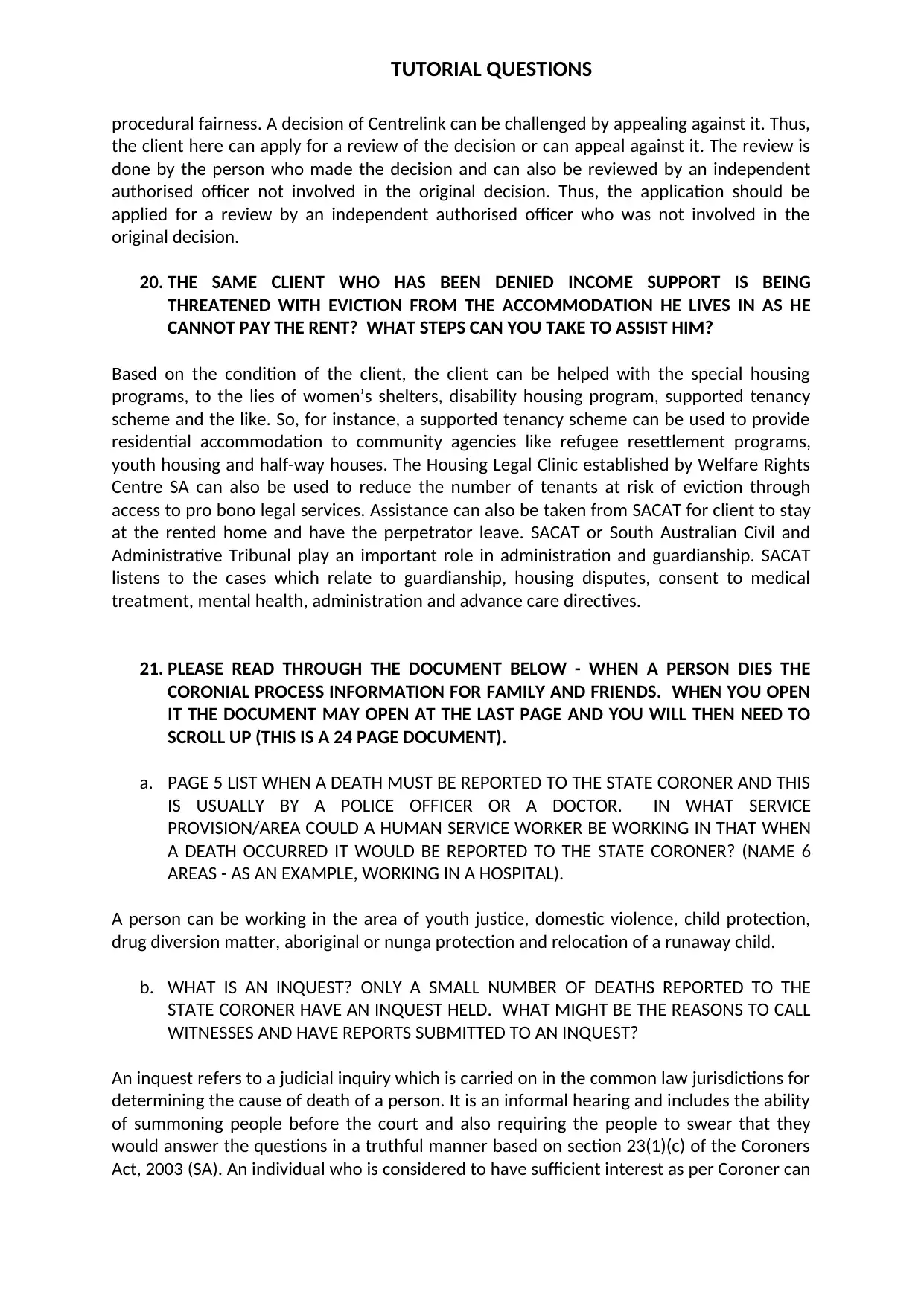
TUTORIAL QUESTIONS
procedural fairness. A decision of Centrelink can be challenged by appealing against it. Thus,
the client here can apply for a review of the decision or can appeal against it. The review is
done by the person who made the decision and can also be reviewed by an independent
authorised officer not involved in the original decision. Thus, the application should be
applied for a review by an independent authorised officer who was not involved in the
original decision.
20. THE SAME CLIENT WHO HAS BEEN DENIED INCOME SUPPORT IS BEING
THREATENED WITH EVICTION FROM THE ACCOMMODATION HE LIVES IN AS HE
CANNOT PAY THE RENT? WHAT STEPS CAN YOU TAKE TO ASSIST HIM?
Based on the condition of the client, the client can be helped with the special housing
programs, to the lies of women’s shelters, disability housing program, supported tenancy
scheme and the like. So, for instance, a supported tenancy scheme can be used to provide
residential accommodation to community agencies like refugee resettlement programs,
youth housing and half-way houses. The Housing Legal Clinic established by Welfare Rights
Centre SA can also be used to reduce the number of tenants at risk of eviction through
access to pro bono legal services. Assistance can also be taken from SACAT for client to stay
at the rented home and have the perpetrator leave. SACAT or South Australian Civil and
Administrative Tribunal play an important role in administration and guardianship. SACAT
listens to the cases which relate to guardianship, housing disputes, consent to medical
treatment, mental health, administration and advance care directives.
21. PLEASE READ THROUGH THE DOCUMENT BELOW - WHEN A PERSON DIES THE
CORONIAL PROCESS INFORMATION FOR FAMILY AND FRIENDS. WHEN YOU OPEN
IT THE DOCUMENT MAY OPEN AT THE LAST PAGE AND YOU WILL THEN NEED TO
SCROLL UP (THIS IS A 24 PAGE DOCUMENT).
a. PAGE 5 LIST WHEN A DEATH MUST BE REPORTED TO THE STATE CORONER AND THIS
IS USUALLY BY A POLICE OFFICER OR A DOCTOR. IN WHAT SERVICE
PROVISION/AREA COULD A HUMAN SERVICE WORKER BE WORKING IN THAT WHEN
A DEATH OCCURRED IT WOULD BE REPORTED TO THE STATE CORONER? (NAME 6
AREAS - AS AN EXAMPLE, WORKING IN A HOSPITAL).
A person can be working in the area of youth justice, domestic violence, child protection,
drug diversion matter, aboriginal or nunga protection and relocation of a runaway child.
b. WHAT IS AN INQUEST? ONLY A SMALL NUMBER OF DEATHS REPORTED TO THE
STATE CORONER HAVE AN INQUEST HELD. WHAT MIGHT BE THE REASONS TO CALL
WITNESSES AND HAVE REPORTS SUBMITTED TO AN INQUEST?
An inquest refers to a judicial inquiry which is carried on in the common law jurisdictions for
determining the cause of death of a person. It is an informal hearing and includes the ability
of summoning people before the court and also requiring the people to swear that they
would answer the questions in a truthful manner based on section 23(1)(c) of the Coroners
Act, 2003 (SA). An individual who is considered to have sufficient interest as per Coroner can
procedural fairness. A decision of Centrelink can be challenged by appealing against it. Thus,
the client here can apply for a review of the decision or can appeal against it. The review is
done by the person who made the decision and can also be reviewed by an independent
authorised officer not involved in the original decision. Thus, the application should be
applied for a review by an independent authorised officer who was not involved in the
original decision.
20. THE SAME CLIENT WHO HAS BEEN DENIED INCOME SUPPORT IS BEING
THREATENED WITH EVICTION FROM THE ACCOMMODATION HE LIVES IN AS HE
CANNOT PAY THE RENT? WHAT STEPS CAN YOU TAKE TO ASSIST HIM?
Based on the condition of the client, the client can be helped with the special housing
programs, to the lies of women’s shelters, disability housing program, supported tenancy
scheme and the like. So, for instance, a supported tenancy scheme can be used to provide
residential accommodation to community agencies like refugee resettlement programs,
youth housing and half-way houses. The Housing Legal Clinic established by Welfare Rights
Centre SA can also be used to reduce the number of tenants at risk of eviction through
access to pro bono legal services. Assistance can also be taken from SACAT for client to stay
at the rented home and have the perpetrator leave. SACAT or South Australian Civil and
Administrative Tribunal play an important role in administration and guardianship. SACAT
listens to the cases which relate to guardianship, housing disputes, consent to medical
treatment, mental health, administration and advance care directives.
21. PLEASE READ THROUGH THE DOCUMENT BELOW - WHEN A PERSON DIES THE
CORONIAL PROCESS INFORMATION FOR FAMILY AND FRIENDS. WHEN YOU OPEN
IT THE DOCUMENT MAY OPEN AT THE LAST PAGE AND YOU WILL THEN NEED TO
SCROLL UP (THIS IS A 24 PAGE DOCUMENT).
a. PAGE 5 LIST WHEN A DEATH MUST BE REPORTED TO THE STATE CORONER AND THIS
IS USUALLY BY A POLICE OFFICER OR A DOCTOR. IN WHAT SERVICE
PROVISION/AREA COULD A HUMAN SERVICE WORKER BE WORKING IN THAT WHEN
A DEATH OCCURRED IT WOULD BE REPORTED TO THE STATE CORONER? (NAME 6
AREAS - AS AN EXAMPLE, WORKING IN A HOSPITAL).
A person can be working in the area of youth justice, domestic violence, child protection,
drug diversion matter, aboriginal or nunga protection and relocation of a runaway child.
b. WHAT IS AN INQUEST? ONLY A SMALL NUMBER OF DEATHS REPORTED TO THE
STATE CORONER HAVE AN INQUEST HELD. WHAT MIGHT BE THE REASONS TO CALL
WITNESSES AND HAVE REPORTS SUBMITTED TO AN INQUEST?
An inquest refers to a judicial inquiry which is carried on in the common law jurisdictions for
determining the cause of death of a person. It is an informal hearing and includes the ability
of summoning people before the court and also requiring the people to swear that they
would answer the questions in a truthful manner based on section 23(1)(c) of the Coroners
Act, 2003 (SA). An individual who is considered to have sufficient interest as per Coroner can
⊘ This is a preview!⊘
Do you want full access?
Subscribe today to unlock all pages.

Trusted by 1+ million students worldwide
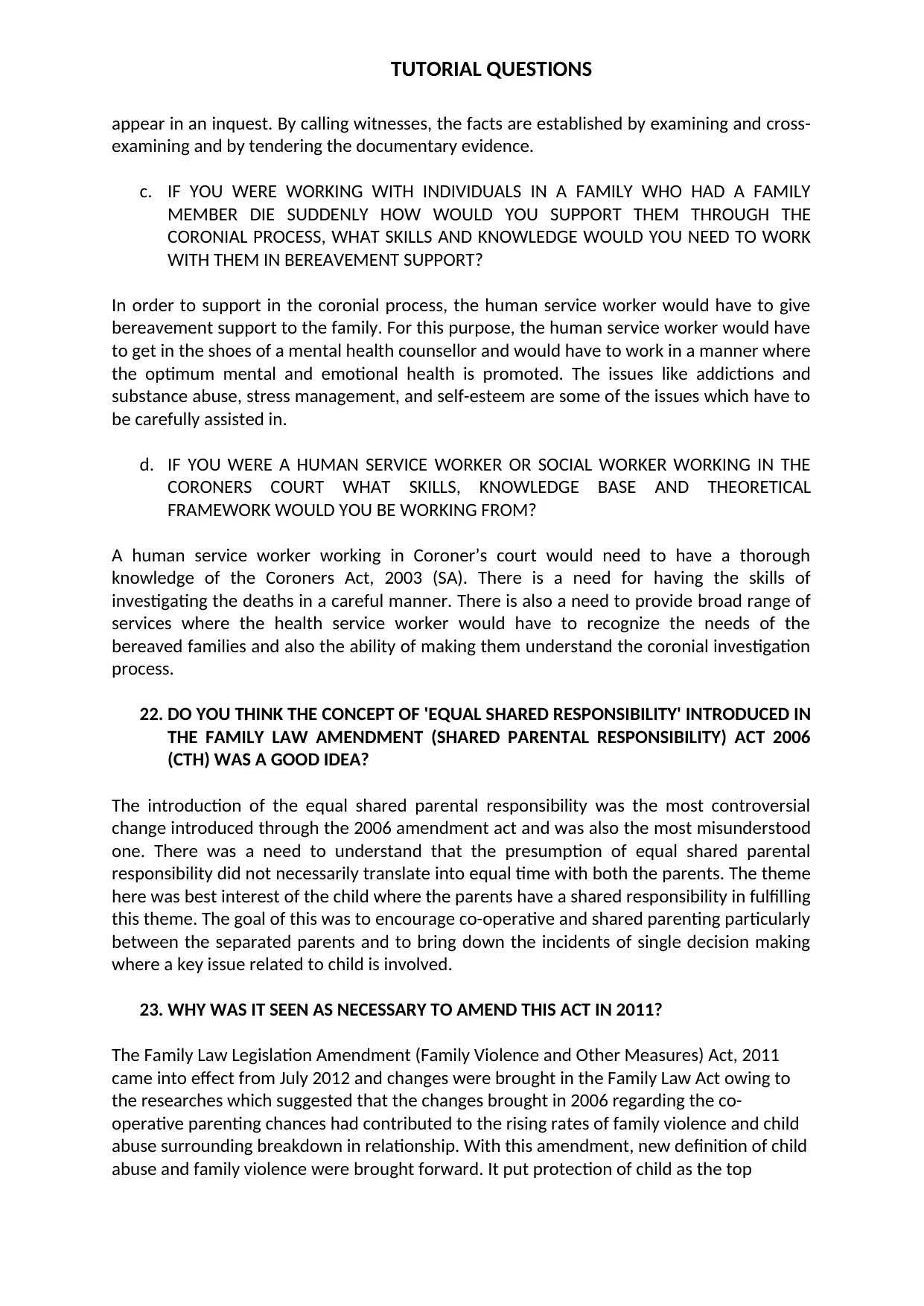
TUTORIAL QUESTIONS
appear in an inquest. By calling witnesses, the facts are established by examining and cross-
examining and by tendering the documentary evidence.
c. IF YOU WERE WORKING WITH INDIVIDUALS IN A FAMILY WHO HAD A FAMILY
MEMBER DIE SUDDENLY HOW WOULD YOU SUPPORT THEM THROUGH THE
CORONIAL PROCESS, WHAT SKILLS AND KNOWLEDGE WOULD YOU NEED TO WORK
WITH THEM IN BEREAVEMENT SUPPORT?
In order to support in the coronial process, the human service worker would have to give
bereavement support to the family. For this purpose, the human service worker would have
to get in the shoes of a mental health counsellor and would have to work in a manner where
the optimum mental and emotional health is promoted. The issues like addictions and
substance abuse, stress management, and self-esteem are some of the issues which have to
be carefully assisted in.
d. IF YOU WERE A HUMAN SERVICE WORKER OR SOCIAL WORKER WORKING IN THE
CORONERS COURT WHAT SKILLS, KNOWLEDGE BASE AND THEORETICAL
FRAMEWORK WOULD YOU BE WORKING FROM?
A human service worker working in Coroner’s court would need to have a thorough
knowledge of the Coroners Act, 2003 (SA). There is a need for having the skills of
investigating the deaths in a careful manner. There is also a need to provide broad range of
services where the health service worker would have to recognize the needs of the
bereaved families and also the ability of making them understand the coronial investigation
process.
22. DO YOU THINK THE CONCEPT OF 'EQUAL SHARED RESPONSIBILITY' INTRODUCED IN
THE FAMILY LAW AMENDMENT (SHARED PARENTAL RESPONSIBILITY) ACT 2006
(CTH) WAS A GOOD IDEA?
The introduction of the equal shared parental responsibility was the most controversial
change introduced through the 2006 amendment act and was also the most misunderstood
one. There was a need to understand that the presumption of equal shared parental
responsibility did not necessarily translate into equal time with both the parents. The theme
here was best interest of the child where the parents have a shared responsibility in fulfilling
this theme. The goal of this was to encourage co-operative and shared parenting particularly
between the separated parents and to bring down the incidents of single decision making
where a key issue related to child is involved.
23. WHY WAS IT SEEN AS NECESSARY TO AMEND THIS ACT IN 2011?
The Family Law Legislation Amendment (Family Violence and Other Measures) Act, 2011
came into effect from July 2012 and changes were brought in the Family Law Act owing to
the researches which suggested that the changes brought in 2006 regarding the co-
operative parenting chances had contributed to the rising rates of family violence and child
abuse surrounding breakdown in relationship. With this amendment, new definition of child
abuse and family violence were brought forward. It put protection of child as the top
appear in an inquest. By calling witnesses, the facts are established by examining and cross-
examining and by tendering the documentary evidence.
c. IF YOU WERE WORKING WITH INDIVIDUALS IN A FAMILY WHO HAD A FAMILY
MEMBER DIE SUDDENLY HOW WOULD YOU SUPPORT THEM THROUGH THE
CORONIAL PROCESS, WHAT SKILLS AND KNOWLEDGE WOULD YOU NEED TO WORK
WITH THEM IN BEREAVEMENT SUPPORT?
In order to support in the coronial process, the human service worker would have to give
bereavement support to the family. For this purpose, the human service worker would have
to get in the shoes of a mental health counsellor and would have to work in a manner where
the optimum mental and emotional health is promoted. The issues like addictions and
substance abuse, stress management, and self-esteem are some of the issues which have to
be carefully assisted in.
d. IF YOU WERE A HUMAN SERVICE WORKER OR SOCIAL WORKER WORKING IN THE
CORONERS COURT WHAT SKILLS, KNOWLEDGE BASE AND THEORETICAL
FRAMEWORK WOULD YOU BE WORKING FROM?
A human service worker working in Coroner’s court would need to have a thorough
knowledge of the Coroners Act, 2003 (SA). There is a need for having the skills of
investigating the deaths in a careful manner. There is also a need to provide broad range of
services where the health service worker would have to recognize the needs of the
bereaved families and also the ability of making them understand the coronial investigation
process.
22. DO YOU THINK THE CONCEPT OF 'EQUAL SHARED RESPONSIBILITY' INTRODUCED IN
THE FAMILY LAW AMENDMENT (SHARED PARENTAL RESPONSIBILITY) ACT 2006
(CTH) WAS A GOOD IDEA?
The introduction of the equal shared parental responsibility was the most controversial
change introduced through the 2006 amendment act and was also the most misunderstood
one. There was a need to understand that the presumption of equal shared parental
responsibility did not necessarily translate into equal time with both the parents. The theme
here was best interest of the child where the parents have a shared responsibility in fulfilling
this theme. The goal of this was to encourage co-operative and shared parenting particularly
between the separated parents and to bring down the incidents of single decision making
where a key issue related to child is involved.
23. WHY WAS IT SEEN AS NECESSARY TO AMEND THIS ACT IN 2011?
The Family Law Legislation Amendment (Family Violence and Other Measures) Act, 2011
came into effect from July 2012 and changes were brought in the Family Law Act owing to
the researches which suggested that the changes brought in 2006 regarding the co-
operative parenting chances had contributed to the rising rates of family violence and child
abuse surrounding breakdown in relationship. With this amendment, new definition of child
abuse and family violence were brought forward. It put protection of child as the top
Paraphrase This Document
Need a fresh take? Get an instant paraphrase of this document with our AI Paraphraser
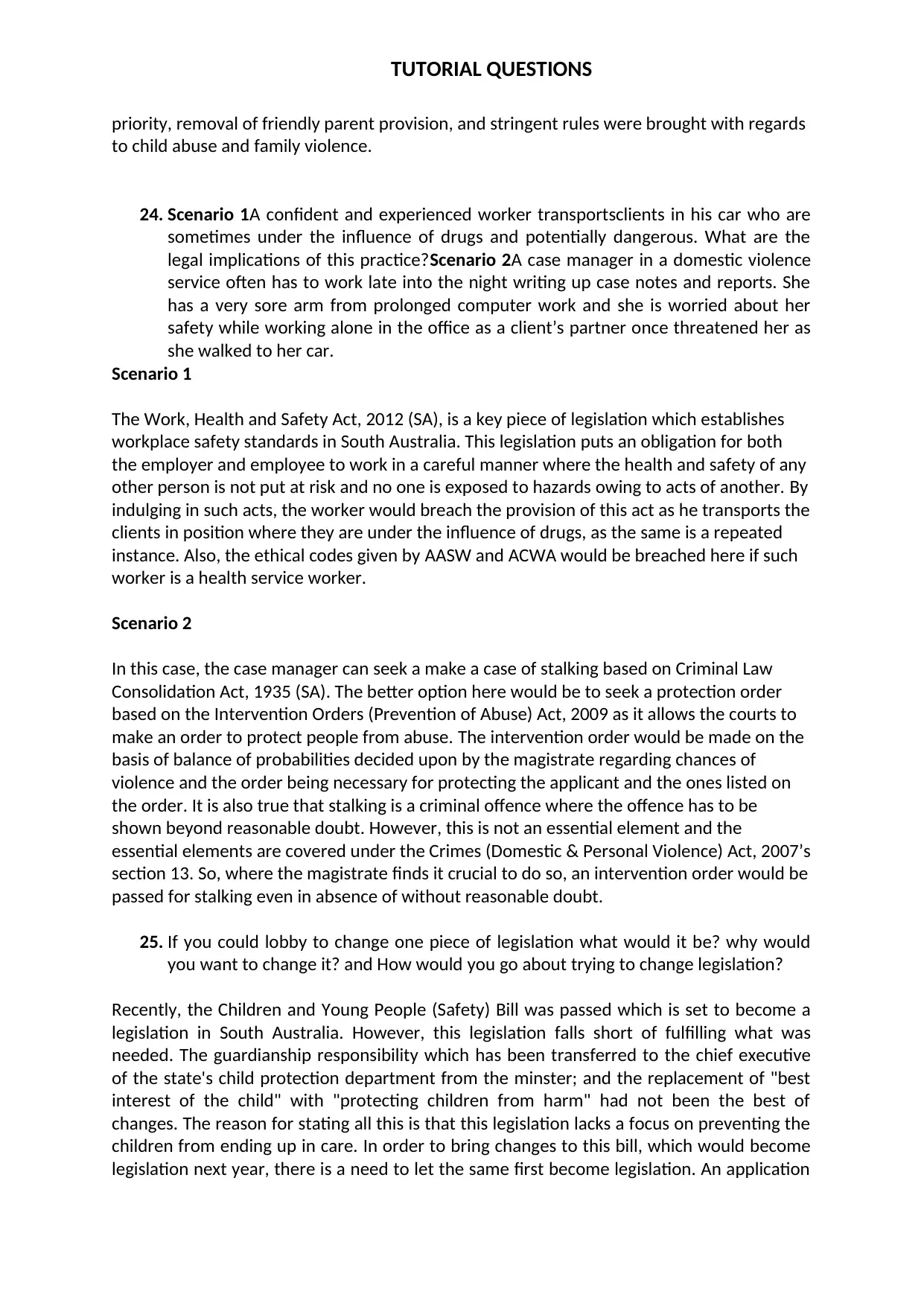
TUTORIAL QUESTIONS
priority, removal of friendly parent provision, and stringent rules were brought with regards
to child abuse and family violence.
24. Scenario 1A confident and experienced worker transportsclients in his car who are
sometimes under the influence of drugs and potentially dangerous. What are the
legal implications of this practice?Scenario 2A case manager in a domestic violence
service often has to work late into the night writing up case notes and reports. She
has a very sore arm from prolonged computer work and she is worried about her
safety while working alone in the office as a client’s partner once threatened her as
she walked to her car.
Scenario 1
The Work, Health and Safety Act, 2012 (SA), is a key piece of legislation which establishes
workplace safety standards in South Australia. This legislation puts an obligation for both
the employer and employee to work in a careful manner where the health and safety of any
other person is not put at risk and no one is exposed to hazards owing to acts of another. By
indulging in such acts, the worker would breach the provision of this act as he transports the
clients in position where they are under the influence of drugs, as the same is a repeated
instance. Also, the ethical codes given by AASW and ACWA would be breached here if such
worker is a health service worker.
Scenario 2
In this case, the case manager can seek a make a case of stalking based on Criminal Law
Consolidation Act, 1935 (SA). The better option here would be to seek a protection order
based on the Intervention Orders (Prevention of Abuse) Act, 2009 as it allows the courts to
make an order to protect people from abuse. The intervention order would be made on the
basis of balance of probabilities decided upon by the magistrate regarding chances of
violence and the order being necessary for protecting the applicant and the ones listed on
the order. It is also true that stalking is a criminal offence where the offence has to be
shown beyond reasonable doubt. However, this is not an essential element and the
essential elements are covered under the Crimes (Domestic & Personal Violence) Act, 2007’s
section 13. So, where the magistrate finds it crucial to do so, an intervention order would be
passed for stalking even in absence of without reasonable doubt.
25. If you could lobby to change one piece of legislation what would it be? why would
you want to change it? and How would you go about trying to change legislation?
Recently, the Children and Young People (Safety) Bill was passed which is set to become a
legislation in South Australia. However, this legislation falls short of fulfilling what was
needed. The guardianship responsibility which has been transferred to the chief executive
of the state's child protection department from the minster; and the replacement of "best
interest of the child" with "protecting children from harm" had not been the best of
changes. The reason for stating all this is that this legislation lacks a focus on preventing the
children from ending up in care. In order to bring changes to this bill, which would become
legislation next year, there is a need to let the same first become legislation. An application
priority, removal of friendly parent provision, and stringent rules were brought with regards
to child abuse and family violence.
24. Scenario 1A confident and experienced worker transportsclients in his car who are
sometimes under the influence of drugs and potentially dangerous. What are the
legal implications of this practice?Scenario 2A case manager in a domestic violence
service often has to work late into the night writing up case notes and reports. She
has a very sore arm from prolonged computer work and she is worried about her
safety while working alone in the office as a client’s partner once threatened her as
she walked to her car.
Scenario 1
The Work, Health and Safety Act, 2012 (SA), is a key piece of legislation which establishes
workplace safety standards in South Australia. This legislation puts an obligation for both
the employer and employee to work in a careful manner where the health and safety of any
other person is not put at risk and no one is exposed to hazards owing to acts of another. By
indulging in such acts, the worker would breach the provision of this act as he transports the
clients in position where they are under the influence of drugs, as the same is a repeated
instance. Also, the ethical codes given by AASW and ACWA would be breached here if such
worker is a health service worker.
Scenario 2
In this case, the case manager can seek a make a case of stalking based on Criminal Law
Consolidation Act, 1935 (SA). The better option here would be to seek a protection order
based on the Intervention Orders (Prevention of Abuse) Act, 2009 as it allows the courts to
make an order to protect people from abuse. The intervention order would be made on the
basis of balance of probabilities decided upon by the magistrate regarding chances of
violence and the order being necessary for protecting the applicant and the ones listed on
the order. It is also true that stalking is a criminal offence where the offence has to be
shown beyond reasonable doubt. However, this is not an essential element and the
essential elements are covered under the Crimes (Domestic & Personal Violence) Act, 2007’s
section 13. So, where the magistrate finds it crucial to do so, an intervention order would be
passed for stalking even in absence of without reasonable doubt.
25. If you could lobby to change one piece of legislation what would it be? why would
you want to change it? and How would you go about trying to change legislation?
Recently, the Children and Young People (Safety) Bill was passed which is set to become a
legislation in South Australia. However, this legislation falls short of fulfilling what was
needed. The guardianship responsibility which has been transferred to the chief executive
of the state's child protection department from the minster; and the replacement of "best
interest of the child" with "protecting children from harm" had not been the best of
changes. The reason for stating all this is that this legislation lacks a focus on preventing the
children from ending up in care. In order to bring changes to this bill, which would become
legislation next year, there is a need to let the same first become legislation. An application

TUTORIAL QUESTIONS
needs to be made to leading lawyers and politicians to obtain a view on this. If the majority
have similar views, the application would then be made to the relevant authority.
needs to be made to leading lawyers and politicians to obtain a view on this. If the majority
have similar views, the application would then be made to the relevant authority.
⊘ This is a preview!⊘
Do you want full access?
Subscribe today to unlock all pages.

Trusted by 1+ million students worldwide
1 out of 9
Related Documents
Your All-in-One AI-Powered Toolkit for Academic Success.
+13062052269
info@desklib.com
Available 24*7 on WhatsApp / Email
![[object Object]](/_next/static/media/star-bottom.7253800d.svg)
Unlock your academic potential
Copyright © 2020–2026 A2Z Services. All Rights Reserved. Developed and managed by ZUCOL.




